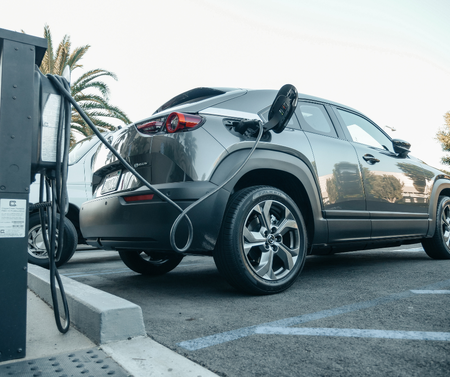
Kane County Outlines Phase-Out of Key Federal Clean Energy Tax Credits
The Kane County Department of Environmental and Water Resources detailed the timeline of federal tax credits that will be phased out over the next year, affecting incentives for clean vehicles, home energy upgrades, and solar energy installations. These credits and rebates stem from recent Congressional action that updated and modified climate-related policies, including provisions from the Inflation Reduction Act (IRA).
Key Tax Credits Phasing Out Soon:
- Clean Vehicle Tax Credits (25E, 30D, & 45W) Expires after September 30th, 2025
1. Used Electric Vehicles (25E): Offers up to $4000 for used electric, plug-in hybrid, and fuel cell electric vehicle. You can find which vehicles qualify for the tax credit here
2. New Clean Vehicles (30D): Offers up to $7500 for a new electric, plug-in hybrid, or fuel cell electric vehicle. You can find which vehicles qualify for the tax credit here
3. Commercial Clean Vehicles (45W): Offers up to $40,000 for commercial vehicles above 14,000 lbs. (ex: school buses or semi-trucks). Only businesses and tax-exempt organizations can quality for the tax credit.
- Energy Efficiency and Residential Solar Credits (25C & 25D) Expires after December 31st, 2025
- Energy Efficient Home Improvement Credit (25C): Offers a 30% credit up to $3200 on certain energy efficiency improvements to your home. The $3200 is split into two categories:
- Up to $2000 for qualified heat pumps, water heaters, biomass stoves or biomass boilers
- Up to $1200 for improvements to the building envelope or for a home energy audit (with limitations)
- Home Energy Audits: $150 limit
- Doors: $250 per door or a $500 limit
- Exterior windows and skylights: $600 limit
- Residential Clean Energy Credit (25D): Offers a 30% tax credit on the material cost of installing new solar panels, solar water heaters, wind turbines, geothermal heat pumps, or battery storage for your home.
- Of the 32,530 people in Illinois who claimed this credit in 2023, the average return was $5,498. This represents a $179 million investment in residential homeowners.
- Energy Efficient Building and Home Credits (45L & 179D) Expires after June 30th, 2026
- New Energy Efficient Home Credit (45L): Incentivizes contractors to build homes that consume less energy, offering $2500 per home that meets Energy Star certification and up to $5000 for homes achieving the US Department of Energy's ZERH certification. These incentives also apply to multifamily housing projects.
- Energy Efficient Commercial Buildings Deduction (179D): Offers a tax deduction to building owners who install energy efficiency upgrades such as interior lighting, building envelope improvements, HVAC systems, and other improvements to a new or existing building. Depending on the amount of energy savings from the energy efficiency upgrades, building owners can save between $.58 to $1.16 per square foot or $2.90 to $5.81 if prevailing wage requirements are met.
- Refueling Credit (30C) Expires after June 30th, 2026
- Alternative Fuel Vehicle Refueling Property Credit (30C): Offers citizens a 30% tax credit or up to $1000 off purchasing a charging port or fuel dispenser. Businesses and government entities also qualify for the tax credit if the equipment is less than 6% of the property's cost or up to $100,000.
Group Purchasing Discounts for Solar in Kane County
Kane County has partnered with Switch Together, a program that helps homeowners and small businesses secure high-quality rooftop solar installations at competitive prices through group purchasing. Participants can also access discounted options for battery storage and electric vehicle chargers. Supported by the Midwest Renewable Energy Association (MREA) and Citizens Utility Board (CUB), Switch Together makes it easier to explore solar options, save money, and make informed decisions.
To learn more, visit SwitchTogether.com/Solar/KaneCounty or contact Sarra Hinshaw, Kane County Sustainability Manager, at 630-208-8665. The deadline to register is September 3, 2025.
How will the Changes Impact my Energy Bills?
According to research done by the Kane County Department of Environmental and Water Resources, the early phase-out of clean energy tax credits will make it harder for the energy sector to meet the growing demand for electricity. The Energy Information Administration (EIA) projects our nation's total electricity consumption will rise by more than two percent year over year, the first time the United States has seen that kind of growth since the 1980s. AI data centers, the electrification of our transportation system (e.g., electric vehicles), and a growing manufacturing sector contribute to this rise in electricity consumption. To meet that growing demand, more power is needed.
Nuclear energy, which currently supplies half of Illinois' electricity needs, takes ten years to get from permitting approval to fully operational. Natural gas, which supplies 16 percent of Illinois's electricity, is limited by a four-year waitlist for new gas plant turbines. Coal, supplying 15 percent of Illinois' electricity, has an uncertain future as five private coal-fired power plants are scheduled to close by the end of the decade. In contrast, renewables have a shorter turnaround, with the average residential solar installation taking 2-3 months, while a solar farm takes up to 18 months.
These restrictions result in higher supply charges on your utility bill, with Princeton University's REPEAT project concluding the average American household will spend an additional $159 per year on their energy bills by 2030.

